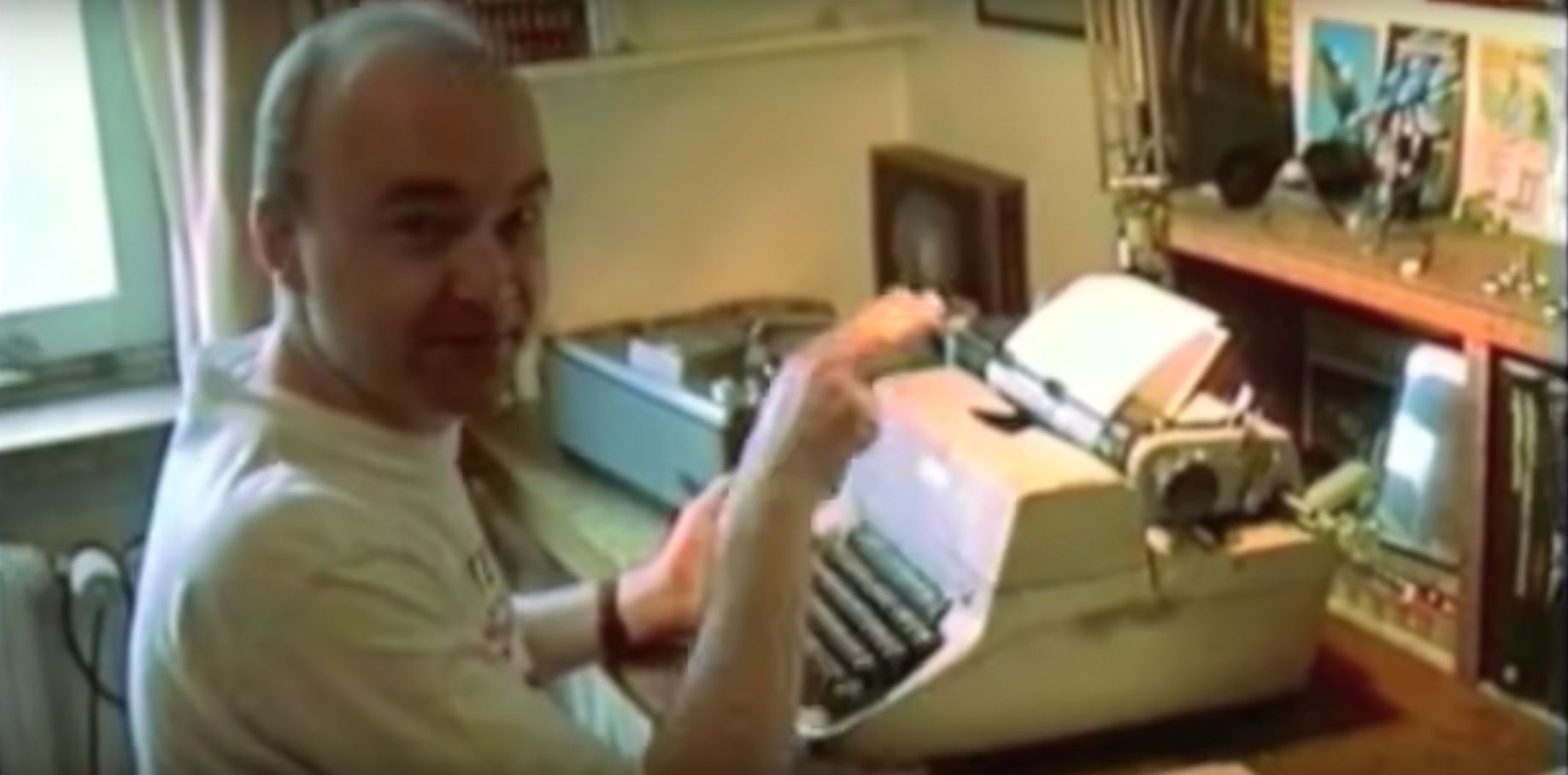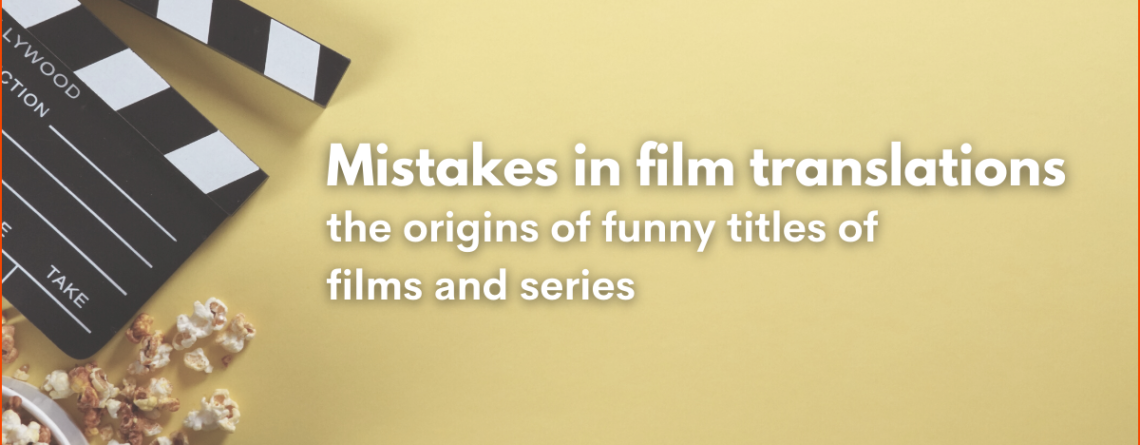Mistakes in film translations – the origins of funny titles of cinema and TV productions (in Poland)
Translation mistakes are painful, though sometimes amusing. But usually, they are simply irritating. Whether we talk about a mistake on a website or a clumsy translation in a book, mistakes always disrupt our reception of content and have a negative impact on a consumer, user or reader experience. They also alter the experience of a viewer, since translation mistakes in films form an entirely separate category – here, we will encounter ill-fitting words, lost meanings and titles that carry a certain notoriety.
Why is a correct film translation so important?
Nowadays, films are not made up only of plot, hectic action and pictures. They also consist of words: dialogues between characters, the narrator’s story, often also inscriptions visible within the presented world – the one on the other side of the screen.
Even though film is a visual art form that follows the “Show, don’t tell” rule, sentences that we hear from the screen are the key to understanding a story that the picture is trying to tell and a significant means of artistic expression. For some filmmakers, extended spoken scenes are even considered to be their trademark.
For Quentin Tarantino, aside from hyperbolic violence and criminal shenanigans, vibrant discussions are also of vital importance – they are often held in a roadside bar while drinking coffee, and concern the validity of tips, “walking the Earth” (or being a bum), vinyl records, or life.
Words create style – of a film and its characters – and they become another element of the film’s structure, placing it in a given cultural, time and genre context. We will hear different style of expression from the cynical detective played by Humphrey Bogart in the American film noir The Maltese Falcon (1941) than from a Gypsy boxer in the British criminal comedy Snatch (2000).
The latter is one of Brad Pitt’s signature roles – he played a member of nomadic Irish ethnic group called the Irish Travellers. His character talks with an accent that is barely understandable not only for a non-English viewer, but also for native Londoners who try to cut a deal with “Pikey”.
100% only
There is no doubt that one cannot fully soak up the atmosphere of a given film and taste all the linguistic flavours without thorough knowledge of a given language. Therefore, the purpose of translation is to bring viewers as close as possible to the reality painted on a screen with the use of words. On the other hand, translation defects can completely ruin the pleasure of watching. On the Polish forum Filmweb, we can find the following comment about the translation of the film Snatch:
If you want to keep 100% of the awesomeness, a tip-top translation is essential.
Humour
Humour may be one of the most difficult elements of the localisation process, especially if it’s based on wordplay. Let’s look at The Muppets TV show. In certain episodes, there is a recurring sketch with Dr Bob – a parody of American hospital drama series.
The nurses (including Miss Piggy) keep repeating – in different variants – the phrase, “Dr Bob is losing his patients.” The English word patients is pronounced exactly like the word patience; therefore, the doctor is losing his patients, but he swears (while banging his fist) that he’s not losing his… patience.
Although the translator always walks a tightrope between being faithful to the original and maintaining the linguistic artistry of translation, when it comes to humour, one more question has to be answered: is the joke universal enough to make viewers from the target cultural sphere laugh?
One of the strategies to deal with this problem is using native contexts that are not present in the original.
In the Polish dubbing of the animated film Shrek, a flying Donkey sings, “Latać każdy może, trochę lepiej, czasem trochę gorzej” (“Everybody can fly, a little better, sometimes a little worse”). It’s a direct reference to the song titled Śpiewać każdy może (“Everybody Can Sing”; words: Jonasz Kofta, music: Stanisław Syrewicz) and Jerzy Stuhr’s iconic performance at the XV National Festival of Polish Song in Opole in 1977. It’s no coincidence that in Shrek it is Stuhr that voices the character of Donkey. In such cases, the localised version becomes a completely new version of a film.
Where do mistakes in translation come from?
A low quality of localisation and translation mistakes in films are first and foremost a result of failing to understand the source material. It might be because of insufficient linguistic competences, especially when it comes to idiomatic expressions that cannot be translated into another language literally, since the meaning of an idiom cannot be derived from its individual components.
If a police officer says that a bandit took out a priest, in Polish it would literally mean “wyjął księdza” (as in took him out of his car, for example), so in that case a ham-fisted literal translation could only confuse the audience, as they would not be able to understand what is going on (and the translator didn’t understand either). Of course, the bad guy murdered the poor priest.
Officer versus policeman
Sometimes, words are translated literally for completely different cultural realities which they don’t fit at all.
In the United States, civilians address policemen per officer; however, in the Polish language, the term officer is used only for people with the military rank of a second lieutenant and above – in the military and other organisations with a military structure.
A civilian would never call a police officer per “panie oficerze”; “panie władzo” is much more likely. On the other hand, at an American police station, the captain is not really kapitan (meaning a high-grade licenced mariner), as some translate it, but nadkomisarz. A thorough knowledge of a given subject that derives from experience and oftentimes in-depth research forms the basis for good translation.
“The what-man?”
Sometimes a misunderstanding leading to a faulty translation may be a result of a literal failure to understand (hear) a given word. In one of the scenes from the iconic The Boondock Saints (1999), the police officers are investigating a crime scene together with an FBI agent Paul Smecker played by Willem Dafoe.
In one of the various translations, a detective said to the agent that murderers came for a grubas (“the fat guy”). The agent asked him to repeat, to which the guy said the exact same word and Paul responded with, “Fred miał rację” (“Fred was right”).
Who on Earth is Fred? In the original, the policeman made a mistake and first called the victim a “fagman”, and then – when the FBI agent asked him to say it again – he corrected himself and said “fatman”. Paul responded that Freud was right (referring to the Freudian slip).
After all, agent Paul is homosexual himself, and policemen interrogating the crime scene are probably aware of it (which can be deduced from their dumbfounded faces after hearing the comment) and – at this point of the film – the viewers know that as well.
Technology and organisation of work
Nowadays, translators have much more tools at their disposal than they had before. Specialised software and original online platforms created by developers allow a detailed insight into the source material. Video and sound are supplemented by transcriptions of original dialogues that make the work that much easier and enable translators to focus on the creative aspect of their work.
Previously, translators could only use soundtrack in the form of a recording, along with a printed dialogue list in the original language version. Eminent Polish translator and expert on Monty Python productions, Tomasz Beksiński, described his routine as such:

Mistakes in translation may also result from tight deadlines and time pressure. Translation requires a lot of thinking – the more creative or complicated content that requires localisation is, the more time has to be spent on it.
Translating a fairy tale for children is a completely different challenge than translating a documentary about space conquest, choke-full of specialised terminology.
Sometimes, financial aspects also play a part in this. The translation process should absolutely include quality check – editing and proofreading. If a publisher skimps on translation, viewers may be extremely disappointed.
Funny title translations – where do they come from?
Polish translations of film titles are well-known even among casual viewers in Poland and noted for their originality, having become something akin to a meme. Titles such as Wirujący seks (“Spinning sex”, orig. Dirty Dancing) or Elektroniczny morderca (“Electronic killer”, orig. Terminator) are now established classics.
Typical problems arise from misunderstanding or unfamiliarity with the context/plot, which can result in mistakes similar to the ones in dialogues: The Order (2001) with Jean-Claude Van Damme, about the main character’s struggle against a faction of the titular order, initially was given the title Rozkaz – “a command”.
The Last Action Hero was rendered into Polish as Bohater ostatniej akcji, shifting the meaning towards “the hero of a recent (combat) action”, and completely missing the point of a satirical film that mocks every convention of the action genre. Once again context is essential.
Another important point of concern emerges here – the title is supposed to draw attention, even at the expense of faithfulness to the source.
Before you throw a stone at the translator
A film is not just a piece of work with more or less artistic ambitions. It is also – taking into account the commercial aspect – a very expensive undertaking. In order for it to pay off, it needs adequately high box office numbers or – in the streaming era – ratings.
In such cases, the marketing factor is oftentimes the deciding one. It can even happen that the title is forced upon a translator, who has no room for manoeuvre left – the decision is made by the distributor or sometimes even by the producer.
It can even happen that the title issue reaches the director. Steven Spielberg was not impressed with the title Raport mniejszości proposed by a Polish distributor for the film Minority Report (2002) on the basis of a novella written by Philip K. Dick. Spielberg insisted that the Polish version should bear the title Raport specjalny (“a special report”). “The Polish word mniejszość for him connoted ethnic and sexual minorities. Dozens of e-mails were needed to convince the creator of Jaws that literal translation would be the best one” (Muszyński, 2008).
A postman and a killer
Would Listonosz be a more fitting title for the film The Postman (1997) than Wysłannik przyszłości („messenger of the future”)? It would definitely be more faithful, although then we wouldn’t know that it’s a science fiction film about postapocalyptic America, in which Kevin Costner tries to survive while claiming to be an employee in a no longer existing institution.
On the other hand, Wysłannik przyszłości sounds like a title of a film about time travel, which has nothing to do with the actual plot. In the case of Elektroniczny morderca, the title was motivated by wanting to avoid using the word „terminator” that in the 1980s Poland (moreso than now) meant an apprentice learning a craft from a foreman.
Fortunately, the original title was restored after a while and now everybody knows that the Terminator (1984) is a cyborg played by Arnold Schwarzenegger.
The sequel trap
The biggest struggle begins when a given title gets a continuation.
The translated title of Die Hard – Szklana Pułapka (“a glass trap”) – refers to the plot more than to the title itself. The actual office building that was taken over by terrorists becomes such a trap for the die-hard policeman, but eventually the sequels (that the translator had no way of knowing about) became an even bigger trap for the linguists:
- Die Hard 2 – Szklana pułapka 2,
- Die Hard with a Vengance – Szklana pułapka 3,
- Live Free or Die Hard – Szklana pułapka 4.0,
- A Good Day to Die Hard – Szklana pułapka 5.
In the case of a comedy titled The Hangover, the Polish title included the name of the place of action – Kac Vegas (“a Vegas hangover”). Consequently, the second film was given an amusing title: Kac Vegas w Bangkoku (“a Vegas hangover in Bangkok”).
References and connotations
Sometimes, distributors consciously refer to other productions in their titles. There are cases in which such references are part of the original title, but other times they are only supposed to build associations with a successful production, even if there is no connection between the two.
Arthur Newman, a comedy-drama about a golfer who fakes his own death and takes on a new identity, was titled Drugie życie króla (2012) in Poland. The distributor wanted to benefit from the fact that the main role was played by Colin Firth, an Oscar-winning actor for his performance in the film Jak zostać królem (The King’s Speech, 2010), a historical drama about the king of Great Britain, George VI.
On the other hand, Wrongfully Accused (1998) and Spy Hard (1996) – parodies of action films The Fugitive (1993) and already-mentioned Die Hard – were titled more successfully. Ścigany became Ści(ą)gany (a play on title which also translates as „copycat”) and Szklana pułapka turned into a memorable Szklanką po łapkach (literally “hit the little mitts with a glass”; here, it’s all about the rhythm and similar-sounding words).
Strategies used for translating film titles
According to Surdyk and Urban (2016), depending on the approach to the title as a linguistic issue and the selected method, the result could be:
- Reproduction / transference – the original title stays the same (e.g. Top Gun).
- Graphic adaptation / naturalisation – the original title stays the same, it is only slightly adjusted, so that it would be easier to pronounce or spell in the target country (e.g., Paryż, Teksas; Pinokio).
- Literal translation / “through-translation” – a word for word translation, without any changes (e.g. Hansel and Gretel: Witch Hunters – Hansel i Gretel: Łowcy czarownic).
- Functional equivalent – if a word is well-known in the source country’s culture, it’s replaced with an equivalent that is functional in the target country’s culture (e.g., Another Cinderella Story – Kopciuszek: Roztańczona historia; “Cinderella: a dancing story” – the focus here is to replace Cinderella with Kopciuszek).
- Paraphrase / description / definition – if the original title could be unclear for the viewers, a descriptive element is added to the title (e.g. CSI: Miami – CSI: Kryminalne zagadki Miami; “CSI: Criminal mysteries of Miami”).
- Expansion – the original title is expanded to give the viewer a better idea about the production (e.g. Aliens as Obcy – decydujące starcie; “Alien – the final battle”). In this category, oftentimes the original title is paired up with an extension in the target language (e.g. Braveheart as Braveheart – waleczne serce).
- Reduction – title loses elements that are unclear, do not match translation stylistically or are deemed unnecessary for any other reason (e.g. The Shepard: Border Parol – Strażnik granicy).
- Free (creative) formulation – the original title is changed to a completely new version (e.g. Fight Club – Podziemny krąg; “an underground circle”). Here, the translator is only limited by their own creativity or the publisher’s requirements, but there is a bigger risk of public slander and ruthless criticism from disappointed viewers.
If you need subtitles for your film – contact the specialists from LOC AT HEART!
You don’t want to risk mistakes in your translation? Film translation is one of the pillars of the locatheart translation agency. Our translators and editors unfailingly ensure high quality of subtitles in terms of linguistic, stylistic and substantive correctness.
The effects of our work can be seen on platforms such as Netflix or Disney+. Whether you’re making an Oscar-worthy production or modest advertising content, or maybe a training material for your company – we will make sure that the translation is of the highest quality.
Contact us today!
Sources:
Muszyński, Ł. (2008, June 27). ARTYKUŁ: Polskie tłumaczenia tytułów filmowych. Filmweb. Retrieved November 4, 2022 from https://www.filmweb.pl/news/ARTYKU%C5%81%3A+Polskie+t%C5%82umaczenia+tytu%C5%82%C3%B3w+filmowych-44124.
Surdyk, A., Urban, A. (2016). Mistranslations of film titles: Between fidelity and advertising. Glottodidactica. An International Journal of Applied Linguistics, 43(1), 161–178. https://doi.org/10.14746/gl.2016.43.1.12.




![How audiovisual translators shape our life? [featured image] - translation agency LocAtHeart](https://locatheart.com/wp-content/uploads/2021/11/LAH_blog_naglowek_nowy_rozmair-1-450x231.png)

Leave a Reply